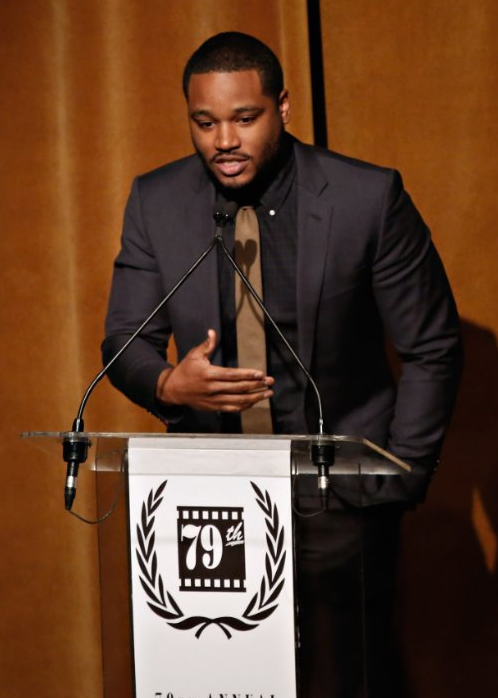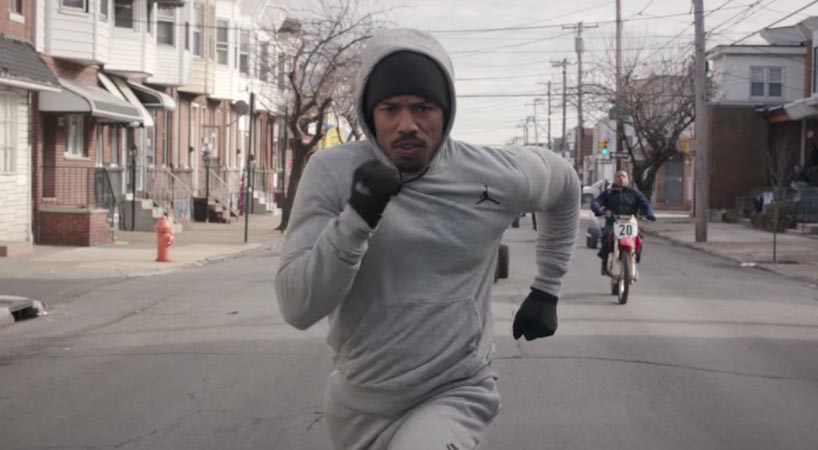
So, having seen the new Star Wars movie yesterday and enjoyed it, let me say that as much fun as Star Wars: The Force Awakens was, it is the second best of the “40-years-since-the-original” follow on films that have recently hit theaters. That’s right, Creed, which opened in November, does simple yet wonderful things with the core elements that helped the original Rocky win the Oscar for Best Picture in 1976.

Just as J. J. Abrams is being praised for returning to many of the best aspects of the 1977 first Star Wars movie, similarly Ryan Coogler has re-imagined the best elements of the original Rocky in service of a story that fans of the original Rocky will recognize, while avoiding making “Rocky 7.”
Here’s some of what I loved about Creed:
The original Rocky offered interesting social commentary on class, race, fame, poverty, and the assumptions and biases that people tend to form based on those elements of an individual’s place in society. It did so by “flipping the script” of audiences’ expectations in 1976. Audiences noted that the wealthy, well-educated, business-savvy sports champion happened to be African-American, and the “nobody” with no education and a job he was ashamed of (street enforcer for a small time loan shark) was white.
In reversing the popularly expected racial roles of the two most vivid characters, Rocky invited viewers to think about race, class, education, fame. It wasn’t particularly noteworthy, by 1976, that the boxing champ, Apollo, was black, but Rocky messed with the racial stereotypes of its time by choosing not to present a black boxing champ who sounded every bit as street as Rocky. Instead, the film gave mid-1970s audiences a character they weren’t expecting: the highly educated, media-savvy, business-minded, utterly confident Apollo, condescending to a Rocky character who sounded like a slow-witted Philly street thug. (And Carl Weathers’ performance as Apollo is truly amazing.)
Creed plays with race, class, privilege, fame, and money too, with a familiar sensibility. Adonis Johnson, born from the union of Apollo and a mistress, is a character who, by the time he emerges as a young boxer, has known both poverty and wealth. One of the main contrivances of the story is that Adonis never knew his father, who died before he was born. But it’s not a bothersome contrivance. Adonis’ mother is unable to care for him, and so after bouncing around the foster care system and getting into repeated trouble with the juvenile justice system, Apollo’s widow, Mary Anne, adopts Adonis and raises him in her luxurious home.
By the time Adonis seeks out Rocky Balboa – long retired and now a Philly restaurant owner – Adonis has lost all traces of his early street punk culture and now sounds like the college educated corporate-professional-in-the-making that he is. As the story advances, we see Adonis and Rocky navigate different neighborhoods – tough, gritty white and black parts of Philly with their respective boxing gyms, as well as middle class and fancy parts of town. Adonis’ eventual opponent, “Pretty” Ricky Conlan, also wears class status on his sleeve. He is English, from a high-crime working class area, and he’s fighting one last fight before he has to begin serving a 7 year prison sentence for a violent crime.
I’m not saying that the Rocky franchise offers us specific beliefs or analyses of race, class, etc. But I am saying that one of the things that made the first Rocky so worthwhile was the way that it included those themes just enough to raise interesting questions for its audience, and this movie grasps that and does it again in its own way.
Philadelphia was a big “character” in Rocky, and it is once again in Creed. Everyone who loves Rocky appreciates the way it portrays Philly, especially gritty white working class Philly. I lived in Philly for 5 years, and it is a city that is both a train-wreck and a place of beauty. It just depends on where you are. The poor and rough neighborhoods of Philly look like they were bombed out. Driving around north Philly in the late 1990s, when my wife and I began living there, there were so many abandoned homes and dilapidated structures that it was hard to believe that there hadn’t recently been a war there. At that time, there were also more than 40,000 abandoned cars in Philly. Peoples’ cars would break down, or get stolen and stripped, and would just get left by the side of the road or on a median. And nobody would remove them. They’d just sit there, rusting.
But Philly is also the city of Kelly Drive and Fairmount Park, of the historic attractions of Independence Mall and the art museum, whose steps Rocky made famous. It’s the home of a huge harbor, tons of row houses, and really good Italian food.
The underdog image created by Philly in Rocky is still present in Creed, even though Adonis is a newcomer to the city.


Courageous women overcoming obstacles are the love interests of Rocky and Adonis. In Rocky, Talia Shire’s Adrian is an intense introvert who is afraid to come out of her shell, largely because her brother, Paulie, treats her like crap and belittles her constantly. But she ends up standing up to Paulie’s bullying, and there’s this great moment when, as he’s having a drunken rage, she grabs him and yells, “I take care of you Paulie, I don’t owe you nothin’! And you made me feel like a loser. I’m not a loser!”


Adonis falls in love with a talented and up-and-coming singer / songwriter, Bianca (Tessa Thompson). She struggles to make ends meet, takes her art seriously, and she deals with a degenerative hearing loss condition that will at some point lead to total deafness. When Adonis asks her how she copes with the painful knowledge that the time she has available for music may be short, she tells him that she concentrates on enjoying what she’s able to do in the present time, and she tries to accept what she can’t change.
I realize that the “tough woman behind the tough-but-self-doubting-man” thing is a movie cliche. Yes. But, Adrian and Bianca are not characters who define their lives in terms of supporting the heroic men they love. They are heroes of their own personal struggles, and the boxers they love learn important things about courage from them. Adrian discovers herself in the course of dating Rocky, and then busts out of the depressing scripted life that her brother and her working class Italian Philly culture would keep her in. Bianca is in a really different place in her life when Adonis meets her. She’s already pretty self-realized, very together, very independent, and the captain of her own ship.
Aging, illness, loss, and the fleeting nature of time are themes in Creed that are played with honesty and poignancy. Rocky delved a bit into those themes, mainly through Mick (Burgess Meredith), who laments the missed opportunities in his lifetime and who struggles with his own aging. Creed does lovely things with the Rocky character’s ways of acknowledging and coping with the limitations of his aging body. Rocky also faces a serious illness, and while the way he and Adonis come to bond around that challenge definitely falls into cheesiness, it’s still a thoughtful and sensitive portrayal that felt honest at its core, to me at least.
Finally, one of the things people love most about Rocky is that it’s a movie that’s as much about vulnerability as it is about strength, about self-doubt as much as the discovery of courage. And it does a lovely job of visually presenting us with images of people as beings who contain these contrasts in odd or ironic looking packages. When big, buff Sylvester Stallone shuffles around with his head down and struggles to find a reason not to think of himself as anything more than the publicity gimmick that Apollo and his business handlers believe him to be, we’re charmed by the optics of the self-doubting giant. And when petite, mousy Talia Shire finally roars like a lion at her abusive brother, the same kind of visual irony adds depth to the drama. Creed is about these themes too, and once again it’s easy for audience members to relate to these characters.
Both of these films are “boxing” movies that only give the viewers a few minutes screen time depicting a boxing match. The original Rocky also bucked conventions by having our hero lose the climactic boxing match to Apollo Creed by a split decision. When I went to see Creed, I wondered if the film would follow that story element in turn. If you haven’t seen the movie yet, my suggestion is you treat yourself and find out!

I appreciated you analysis and love note to Rocky, Creed and Philly. I too loved the movie Rocky and in turn Creed. Thanks for sharing.
LikeLike
Hi Aura – thank you !!!
LikeLike